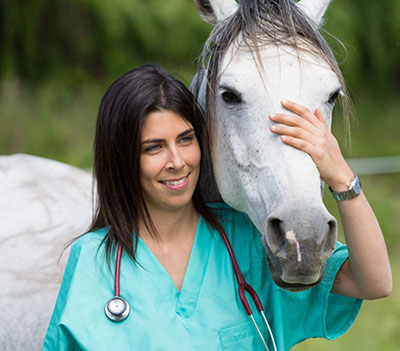Veterinarians in Arkansas
What skills and traits are necessary to be a veterinarian?
To be a veterinary doctor, a person must have an interest in science, be able to communicate
with others effectively and have compassion for animals.
When do I start preparing for a career in veterinary medicine?
Preparation begins in high school by taking science classes and gaining experience working with animals. The 4-H Veterinary Science Program provides both! Our program also introduces students to Arkansas veterinarians and veterinary technicians who will serve as mentors.
What kind of classes should I take to get ready for veterinary school?
The next step in becoming a veterinarian is to earn a 4-year bachelor degree in a field related to veterinary science (e.g. animal science, zoology, pre-veterinary, etc.). The University of Arkansas has an excellent pre-vet program. It is important to remember that each veterinary college has different prerequisite criteria for admission into their program, so you must know the prerequisites for your veterinary college(s) of choice. Many veterinary schools have an early admission program that allows certain students to start veterinary classes while finishing their bachelor degree. The condition is that the student must attend a college in that particular state for his/her bachelor degree.
How do I choose the right veterinary college for me?
Arkansas does not have a veterinary college, but Arkansas does have contracts with
veterinary colleges in other states that allow Arkansas students to attend while paying
in-state tuition. Students are chosen by the veterinary school admissions committee
based on their application packet. You can find out more about this process by visiting
the Arkansas Department of Higher Education. You should choose a veterinary college based on the cost of tuition, the cost of
living and personality fit. This is important because veterinary college is expensive!
What can I expect as a veterinary student?
Expect to study hard and budget your time well! You will attend classes for 3 years, learning about both small and large animal species as well as laws and ethics. You will participate in clinical rotations your 4th year. Two of the rotations are usually completed outside of the veterinary school setting and are called preceptorships. Even though you will attend veterinary school in another state, you will always have a connection to Arkansas through the Arkansas Veterinary Medical Association. Once you pass all of your classes and finish your clinical rotations, you will be eligible to graduate. Sometime during your 4th year, you will take the North American Veterinary Licensing Exam. (NAVLE®) Once you pass the NAVLE®, you can apply for a license in Arkansas. In order to receive a license, you must take an exam that is based on the Arkansas Veterinary Practice Act.
How do I pay for veterinary school?
Most students acquire student loans to pay for tuition and living expenses as there is little time for employment. Scholarships are available each year, but are limited. Ideally, money should be saved prior to attending college to avoid excessive debt. One way to save money is for the student to establish residency in the state of their college of choice before applying to college to avoid out-of-state tuition fees. Another option is to find creative ways to pay off student loans after graduating veterinary school. The Veterinary Medicine Loan Repayment Program is a program sponsored by the United States Department of Agriculture that will pay a substantial amount toward student loan debt in exchange for serving in a designated veterinary shortage situation. There are several counties in Arkansas that are eligible as shortage areas. There are similar loan repayment programs available for industry and government veterinary jobs.
Video presented by the American Veterinary Medical Association.